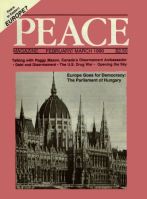
Peace Magazine Feb-Mar 1990, page 9. Some rights reserved.
Search for other articles by Hana Federowicz here
East-central Europeans are asking themselves fundamental questions about democracy: how, when, and for whom? Cooperation is becoming essential among civil societies across the fast-eroding cold war boundaries.
Many credit Gorbachev with initiating the process of democratization. In fact, his reform policies were a response to the strategy of reconstituting civil society promoted by such democratic oppositionists as Adam Michnik, Vaclav Havel, and Georgy Konrad. The strategy blossomed in Poland as a nonviolent social movement for democratic change with the infectious name of Solidarnosc. Although driven underground, an organized, conscious citizenry demanded legal recognition for pluralistic, self-governed institutions. Poles began to find partners for dialogue and common actions in Czechoslovakia, Hungary, East Germany, Ukraine and other neighbors.
The goal was to organize society, bypassing the party-state's monopoly on public life. As a Polish dissident, now chairman of the Citizen's Parliamentary Caucus, put it: "Destroying civil society was the essence of the (totalitarian) system. Constructing it was the essence of liberation."1
The idea of civil society has spread its energizing potential further afield internationally since the "Prague 88" international peace seminar. A non-governmental assembly was proposed, to be made up of independent, democratic social forces from all countries signing the Helsinki Final Act.
It will explore the unrealized possibilities in the Helsinki process and engage independent civil activity from West and East to guarantee political pluralism in international politics. The assembly proposal sets out to provide an ongoing forum for common discussion and action on the issues articulated in a document signed by over 500 independent peace, human rights and ecology activists from East and West (including a few from Canada) entitled: "Giving Real Life to the Helsinki Accords." Its importance lies in the joint efforts it has fostered among independent activists across Europe and North America.
In an article last March, former Charter 77 activist and now Czechoslovak Foreign Minister Jiri Dienstbier described the mid-'80s consensus of independent peace activists. They recognized that "issues of peace and security, detente and cooperation, human rights and self-determination were interconnected and could not be treated in isolation from each other" and that "concentration on a single issue at the expense of all the others (e.g. disarmament) was misleading and unproductive."
The agenda for the proposed assembly emerges out of this consensus: "Only on the basis of European unity in diversity will it be possible to build a fully demilitarized, socially just, ecologically responsible, and culturally diverse European community, which will respect the rights of the individual, the principles of national self-determination, women's rights, social and trade union rights, and the rights of national and other minorities."2
Although now a cabinet minister, Dienstbier recognizes that governments alone are unable to overcome existing international problems. "In pursuit of popular support, they often have to act in accordance with what they see as the momentary demands of the voting public and with other demands. ... Independent activists and movements are free to formulate the social talks that lie ahead much more openly and realistically, because they don't need to take heed of power politics." Dienstbier will be a political ally for civic initiatives.
Why should Canadians participate in the Citizens' Assembly, which might be seen as a European project? Canada is a signatory of the Helsinki Final Act and as such has a stake in the future shape of European security. The more that political, economic and cultural roads to assuring security are developed, the less justification there will be for military means. Now that recognition is gaining that many of the world's present problems cannot be solved in isolation, participation in multilateral fora is especially important. Canadians concerned for regions beyond the European continent should get in on the ground floor on coordinating new Northern initiatives towards the South.
Unfortunately, Canadians have barely participated in the planning process to date. The first meeting of the Citizens' Assembly is planned for this summer in Prague. An organizing committee must pull together support for the Assembly from Canada's peace, human rights, women, ecology and development communities and social change movements. Two East-central European independent peace activists involved in the Civic Assembly will present a seminar at Waterloo University on February 16. A Canadian response to the Prague appeal may be launched then. For information, call Professor John Jawarsky, Department of Political Science, 519/885-1211. ext.6566.
Hania Fedorowicz has been monitoring the Assembly project since attending a preparatory meeting in Milan in January, 1989.
1 Flora Lewis, "Civil Society: Its Limits and Needs" International Herald Tribune, August 30, 1989, p.4.
2 Jiri Dienstbier, "The Helsinki Process 'From Below'" END Journal 37, 1989.

Peace Magazine Feb-Mar 1990, page 9. Some rights reserved.
Search for other articles by Hana Federowicz here